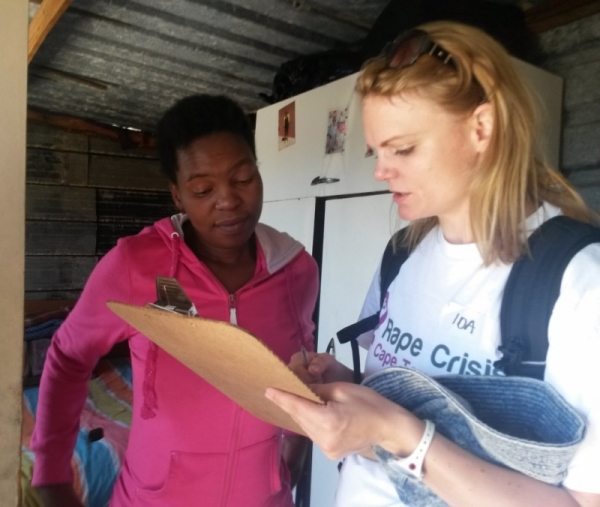Survey shows how unsafe Khayelitsha residents feel

Most of the Harare, Khayelitsha, residents who participated in a survey campaign launched by Rape Crisis this week as part of 16 Days of Activism believe that robbery and housebreaking are the main problems in the area.
“We can’t even walk in the road during the day now because the skollies will still rob you. I’m scared for my children because they play outside. Robbery is very bad here,” said resident Shiyekile Mbaliwe.
A group of ten Rape Crisis volunteers have been conducting door-to-door surveys in different areas of Khayelitsha this week. A similar campaign was run in Athlone last year. The research found that 60% of the participants said high rates of rape made them feel “unsafe, vulnerable and helpless”. It also found that many people were “too scared” to speak out about rape. Using such surveys, Rape Crisis aims to “strengthen the criminal justice system and its response to survivors” in the area.
During the Harare survey on Wednesday, residents were asked several questions, including: Why rape occurred in the community? Who would they tell if they were raped? And do they feel safe?
Most people indicated that they felt unsafe in Harare while others believed the spike in crime was due to an increase in drug abuse and gangsterism.
Resident Sylvia Ngwendu said rape was a serious problem. “What are my rights if I know a child who has been raped, but the parents don’t take them for help?” she asked. “Rape is very traumatic for the person and their family. We have such a big problem with crime here, especially robberies.”
Another resident, Mongi Dikazi, 29, said young girls felt ashamed and uncomfortable after being raped.
“I don’t feel safe living here,” she said. Dikazi said alcohol and drug abuse was rife in the community.
Training and development coordinator in Khayelitsha, Kholeka Booi, said that once the results were compiled, the research could be used to assist government and civil society organisations to better deal with rape and domestic violence cases in the area.
“We are hoping this research will help the Department of Justice here in Khayelitsha to better deal with these cases,” she said.
“The purpose of the surveys and the community dialog is to know exactly why people here are not reporting crimes like rape or domestic violence. There are many social issues that contribute to crime in an area, so this will help us see what people think,” she said.
Booi said the centre provided counselling mostly to women.
“We get a lot of clients who are sent to us and many people just walk in,” she said.
Booi said that having residents participate in the surveys was essential to educating the community about issues relating to rape and domestic violence.
Rape Crisis volunteer Nosicelo Mfumbe said there were distinct socio-economical differences in areas within Khayelitsha which had an impact on the views of residents in a particular area.
For instance, “when we visited Endlovini, we found that because most of the people don’t have toilets or water, they have to go far to the nearest toilet or they go to the bush,” she said. That was when people felt most unsafe. But “in Harare, most of the houses have water and toilets inside, so the issues are slightly different,” she said. “We also found that there are people who need help, but they don’t know where to go for help.”
The results of this week’s surveys will be released at a community dialog event at the Rape Crisis offices in Illitha Park on 10 December.
Next: What are the financial implications of insourcing at UCT?
Previous: Socialism: myths, prejudices and reality

This article is licensed under a Creative Commons Attribution-NoDerivatives 4.0 International License.


